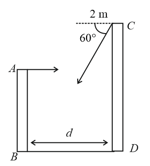Projectile Motion
Projectile Motion: Overview
This topic covers concepts, such as, Projectile Motion, Equation of Path of a Projectile, Horizontal Range of a Projectile & Instantaneous Velocity of a Projectile etc.
Important Questions on Projectile Motion
A particle is projected in x-y plane with y-axis along vertical, the point of projection being origin. The equation of projectile is . The angle of projectile is ---------------------- and initial velocity is -----------------------------------
From a high building, a stone is dropped and simultaneously another identical stone is thrown horizontally with an initial speed of Which one of the following statements is true?
A bullet is fired horizontally from a gun with a speed of in order to hit a target away. From what height above the target should the gun be aimed? (The resistance of air is negligible and ,
Two towers and are situated a distance apart as shown in figure. is high and is high from the ground. An object of mass is thrown from the top of horizontally with a velocity of towards . Simultaneously another object of mass is thrown from the top of at an angle of to the horizontal towards with the same magnitude of initial velocity as that of the first object. The two objects move in the same vertical plane, collide in mid-air and stick to each other. Find the position where the objects hit the ground (from ).

A projectile can have the same range for two angles of projection. If and be the times of flights in the two cases, then the product of the two time of flights is proportional to –
A projectile can have the same range ‘R’ for two angles of projection. If ‘t1’ and ‘t2’ be the times of flight in the two cases, then the product of the two times of flight is proportional to
A boy playing on the roof of a 10 m high building throws a ball with a speed of at an angle of with the horizontal. How far from the throwing point will the ball be at the height of 10 m from the ground? [Take g = 10 ms-2]
A body is projected horizontally from a height of . It reaches the ground at a horizontal distance of . The speed of the particle when it reaches the ground is
The range of a projectile when launched at an angle with the horizontal is . What will be the range of that projectile when launched with the same velocity at an angle to the horizontal?
The maximum range of a gun of horizontal terrain is . If then, muzzle velocity of a shell must be
A ball thrown by one player reaches the other in . The maximum height attained by the ball above the point of projection will be
An artillery piece which consistently shoots its shells with the same muzzle speed has a maximum range . To hit a target which is from the gun and on the same level, the elevation angle of the gun should be
Two particles are projected from the same point with the same speed u such that they have the same range R, but different maximum heights, and Which of the following is correct?
Two guns and can fire bullets at speeds and respectively. From a point on a horizontal ground, they are fired in all possible directions. The ratio of maximum areas covered by the bullets fired by the two guns, on the ground is:
A projectile is given an initial velocity of , where is along the ground and is along the vertical upward. If , the equation of its trajectory is :
For angles of projection of projectile at angle (45o – θ) and (45o + θ), the horizontal range described by the projectile are in the ratio of
Two stones thrown at different angles have same initial velocity and same range. If is the maximum height attained by one stone thrown at an angle of 30o, then the maximum height attained by the other stone is
An arrow is projected into air. Its time of flight is and range is . The maximum height reached by it is (take ),
A helicopter is flying horizontally at an altitude of with a speed of . A packet is dropped from it. The horizontal distance between the point where the packet is dropped and the point where it hits the ground is ,
For a given velocity, a projectile has the same range for two angles of projection. If and are the time of flight in the two cases, then,
